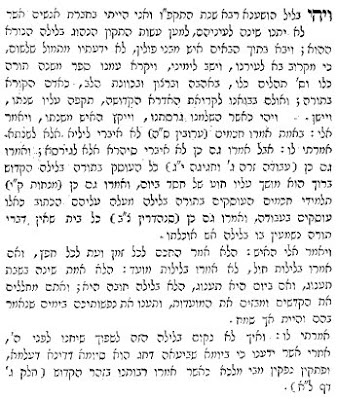 FIRST NIGHT
FIRST NIGHTAnd it was on the night of Hoshana Rabba, in the year 586 {=1826}, and I was in a group of men who did not give sleep to their eyes, in order to perform the tikkun which was customary on that awesome night; and there came, within those who came, a man from the residents of Poland, whom I did not know beforehand, for he only recently came to our city, and he say to my right, and read with us the sefer Mishneh Torah {=Devarim} in its entirety, and the sefer of Tehillim in its entirety, with love and desire and with the intent of the hear, like a man who reads from the Torah. And yet, when we cam to the reading of האדרא הקדושה {?? - perhaps this ?? }, sleep overcame him, and he slept.
And it was, when we finished our reading, the man awoke from his sleep, and said to me: In truth did the Sages say (Eruvin 65) {stated by Rav Yehuda}, "night was only created for sleep."
I said to him: But they also said {on the same daf, Resh Lakish's statement}, "the moon{light} is only created for learning." And they also said (Avodah Zarah daf 3, and Chagiga daf 13), "anyone who engages in Torah at night, the Holy One, Blessed Be He, extends to him a cord of grace in the day." And they said as well (Menachot 110), "Torah scholars who engage in Torah at night, Scriptures reckons them as if they engaged in the {Temple} service." And they said as well (Sanhedrin 92), "any house in which Torah is not heard at night, fire will consume it."
And the man said to me: Did not the wise one say {in Kohelet 3:1}:
| א לַכֹּל, זְמָן; וְעֵת לְכָל-חֵפֶץ, תַּחַת הַשָּׁמָיִם. {פ} | 1 To every thing there is a season, and a time to every purpose under the heaven: {P} |
I said to him: And how could we not arise on this night, to pour our speech before Hashem, once who know that on the seventh day of Succot is the completion of the judgment of the word, and notes go out from the house of the King, as our Rabbis say in the holy Zohar (chelek 3, page 31)?
 And in the midst of this we left the house in which he had made the tikkun, and each mean turned to go to his house, and this man did not do so, but joined with me and occupy me with his claims.
And in the midst of this we left the house in which he had made the tikkun, and each mean turned to go to his house, and this man did not do so, but joined with me and occupy me with his claims.And the man was silent until every man was distant from us, and he turned this way and that, and saw that there was no man {an allusion to Moshe Rabbenu when hitting the Mitzri}, and he stood on the crossroads, and he opened his mouth, and said: Woe to you guilty ones, for you deny the words of our ancient ones the fathers of the world, the instituters of the prayer, who established to say on Yom Kippur, "an end for forgiveness and pardon," while you {plural} say that the decree is not signed until the day of Hoshana Rabba. And not only that but you also deny the words of the Torah itself, which states {Vayikra 16:30}:
tefillin.
I answered him: We did not do this from our own hearts, forfend for us! Rather, our Rabbis, the Sages of the Mishna were the ones who decreed. It says it the Zohar Chadash, Shir haShirim (page 60) that anyone who puts on tefillin on chol haMoed is liable to death, and this is for concealed reasons, which are known to authorized people who stand in the secret assembly of Hashem.

No comments:
Post a Comment